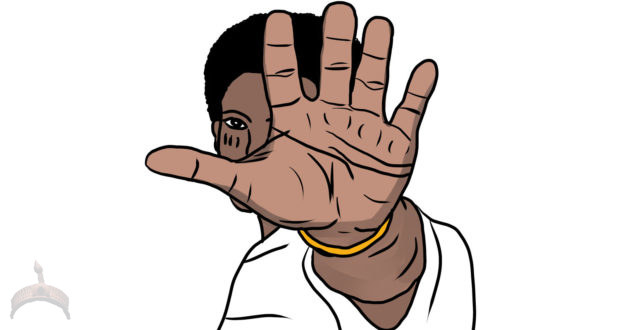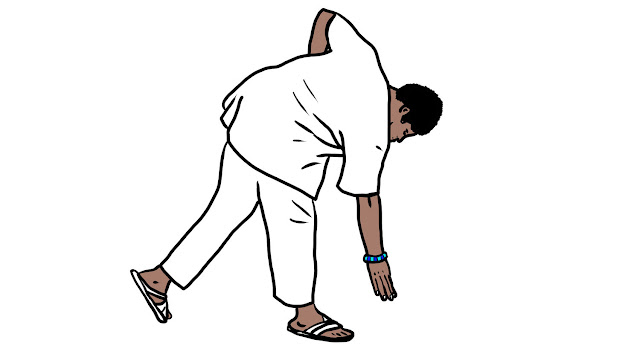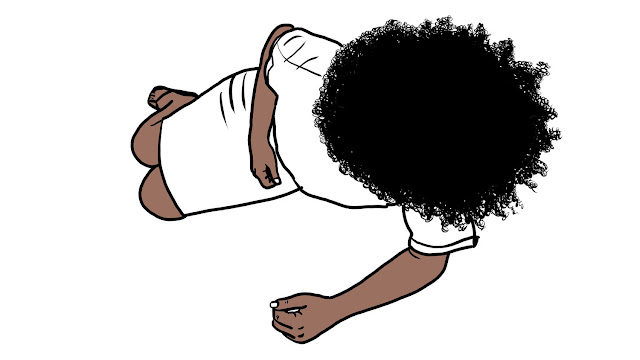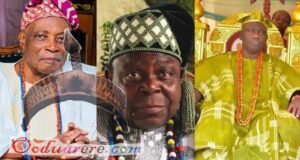ÌKÍNI (GREETINGS)
Yorùbá people appreciate traditional greetings, although most of them will offer you to shake hands, what shows their respect towards the customs of òyìnbó. Kneeling down (women) or prostrating (men) is considered the basic form of greeting. For people educated in the West this “lowering of yourself” gesture is kind of rare and feels very strange at the beginning. After a few times it gets normal and the modern, shortened versions make it very easy to follow the Yorùbá etiquette everywhere. Nevertheless, if you really want to show your deep respect to someone, you certainly have to get down on the floor.
ÌDỌ̀BÁLẸ̀ (PROSTRATION, FOR MEN)
Yorùbá men prostrate to greet a senior member of the society. In the most expressive form this means to lie down completely, with the chest touching the floor. Only the head remains raised up in the air, the face looks towards the person you are greeting. Both hands are formed into one fist (see the “oṣùbà” gesture below) and held directly under the chin. The elbows are tucked under the body and not stretched out to the sides. As one can remain in this position for the following communication you should make yourself feel comfortable here. Just for a short moment, to lower yourself even more, one can stretch out the arms close to the body and put the head and the face down to the floor. This is often seen among Olórìṣà in the Diaspora, in Yorùbáland it is performed only if the reason for the encounter is severe. It is very common not to lie down completely, so that weight still rests on the bent or the stretched arms, enabling the man to keep his upper torso and the head in an almost upward position. Today this can even be shortened, depending on the social setting. Men can “dọ̀bálẹ̀” into a kind of push-up position, where the body doesn’t touch the floor at all, so just the hands and feet get dirty. Instead of prostrating they can bow down their upper body and touch the floor with the right hand, or at least stretch the right hand in the direction of the floor, while the left arm is usually bent and held at the back. The minimum variant, e.g. among friends or close colleagues, is to bow down a little bit and lower the head, called “tẹrígbà”, in the dictionary translated with “to lower the head (to receive a blessing)”.
The complete prostration is not just done in front of a king. It is the usual respectful greeting by men to e-v-e-r-y senior member of the society. A well-educated Yorùbá boy will do this to his parents in the morning! Depending on the situation and the communication you seek, you either quickly greet and stand up again, or at occasions like weddings or receptions at the palace you might remain in this position until the other person tells you “Dìde!” (Stand up!) or touches your shoulder or head as a sign that your greeting is met with kindness.
I remember a story from a Yorùbá friend living in Germany. She took her four-year old son Akin to the office. Akin was playing in another room, when she suddenly heard people crying for the ambulance. Her baby son was lying on the floor and did not move, her colleagues cried for help, as “he suddenly blacked out.” What happened? The company’s boss was walking through the room, and Akin, a well-educated Yorùbá boy, immediately prostrated. Unfortunately, the boss did not recognize him or the tradition of prostrating, but left the boy in his ìdọ̀bálẹ̀ position, how he was found later. Akin politely waited to be released from his first intercultural “wàhálà” (problem)…
ÌKÚNLẸ̀ (KNEELING, FOR WOMEN)
Yorùbá women kneel down on both knees to greet a respected person. Like the half-way prostration, this can be reduced to bending the knees slightly or into a genuflection, kneeling down with one knee only, sometimes even without having this knee touching the floor directly. Kneeling down in this sense is always known as a female gesture in Yorùbáland.
Òrìṣà figures in wooden statues, even the ones for male Òrìṣà like Ṣàngó or Èṣù, are often carved in this sacred position. It is related to the power of women, abundance, reproduction and receiving. This is (or was) a posture to give birth among the Yorùbá women. “Ìkúnlẹ̀ abiyamọ” or “Ìkúnlẹ̀ aboyún” means “giving birth to a baby by a pregnant mother” (Awoyale dictionary). Susanne Wenger writes about this position, when she describes how Timọyìn, violating a taboo, killed an elephant giving birth: “[…] since ‘abiyamọ’, the female in labour (also shortly before or shortly after), whether human or animal, is the holy-of-holies.” A proverb tells us that “Ọjọ́ ìkúnlẹ̀ bí ìgbà tí Orò n lọ̀run ni lára gbogbo abiyamọ” (The day of delivery is to a pregnant mother like the day the Òrìṣà Orò is returning to heaven).
Here I remember the story a British gentleman working in Lagos told me. He complained about his Nigerian boss, he was of advanced age but still running the international company. He was “such a bully, that he made his daughter kneel down every time they met.” He did not know that this was the usual way of showing respect towards the father. He thought it was an overly submissive gesture. Don’t forget, it is another culture! Kneeling down has different meanings in different settings.
ÌYÍKÁ (SWITCHING PROSTRATION, FOR WOMEN)
This is a very special prostration that is combined with a movement from one side of the body to the other. It is known as a female gesture, but that does not mean that it is never performed by men (read below about the gender aspects in greeting). The usual daily greeting performed by a woman is the “ìkúnlẹ̀”, the “ìyíká” is something considered very special. In the “ìyíká” one sits down with the left hip touching the floor, legs are bent, torso moves forward and its weight rests on the stretched arm. The arm is then bent until the forearm completely rests on the floor and carries the weight. It feels like going to lie down on one side of the body. Then, shifting the weight equally to both arms and knees again, one turns her (his) body over to the other side, “láti ọ̀tún sí òsì” (from right to left). An improvised saying for greeting a king in this manner could be something like “Mo yíká ọ̀tún, mo yíká òsì, ki adé pẹ́ l’órí, ki bàtà pẹ́ l’ẹ́sẹ̀, ki ìrùkẹ̀rẹ̀ pẹ́ l’ọ́wọ́, ki àṣe pẹ́ l’ẹ́nu, kábíyèsí, aláṣẹ èkejì òrìṣà.” (“I turn to the right, I turn to the left, may the crown last on the head, the shoes on the feet, the irukere in the hand, the command in the mouth, hail the king, second in command to the Òrìṣà”).
THE GENDER ISSUE
There are exceptions in these greetings. Crossing the borders, men doing the ìkúnlẹ̀ and the ìyíká, women doing the idọ̀bálẹ̀, is possible. In Yorùbá society this is a sign of utmost respect. As Baba Nathan Lugo explains: “In West African Òrìṣà tradition, for the most part, when a person wants to show extra respect to one of his or her seniors in Òrìṣà or to the Òrìṣà itself, they may adopt the greeting of the opposite gender. This demonstrates that the person is going beyond ordinary respect. They may even combine the prostration of their own gender and then use the prostration of the opposite gender immediately after. With some Òrìṣà, that are male or have some male attributes, women may perform idọ̀bálẹ̀ just as if they were men, including Òrìṣà such as Ṣàngó – as his children are all recognized as being male to him – Logunẹ̀dẹ̀, Ọ̀ṣun, even Ọbàtálá at times.” In the Yorùbá Diaspora, where prostration survived only in the sphere of Òrìṣà worship, this can be seen frequently. Again, all these greetings have different combinations and variations, depending on local traditions, the people involved and according to the ritual or social circumstances.
 Ọmọ Oòduà Naija Gist | News From Nigeria | Entertainment gist Nigeria|Networking|News.. Visit for Nigeria breaking news , Nigerian Movies , Naija music , Jobs In Nigeria , Naija News , Nollywood, Gist and more
Ọmọ Oòduà Naija Gist | News From Nigeria | Entertainment gist Nigeria|Networking|News.. Visit for Nigeria breaking news , Nigerian Movies , Naija music , Jobs In Nigeria , Naija News , Nollywood, Gist and more













(Y)